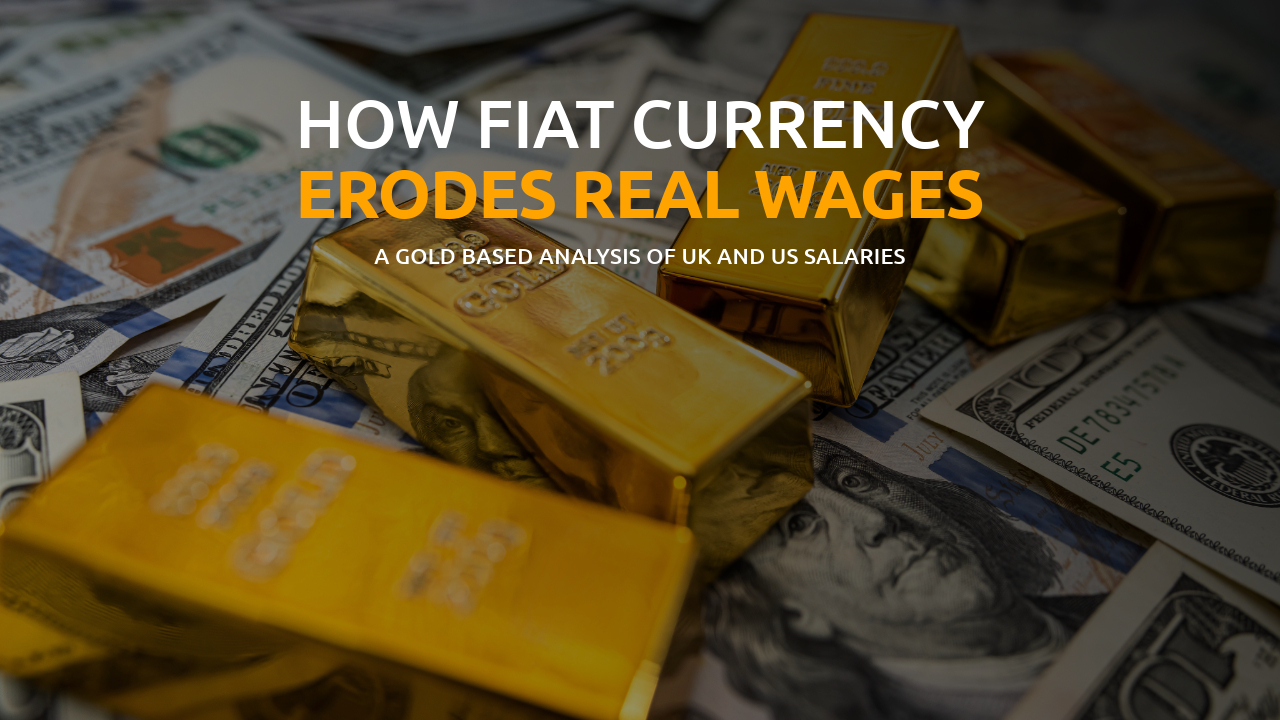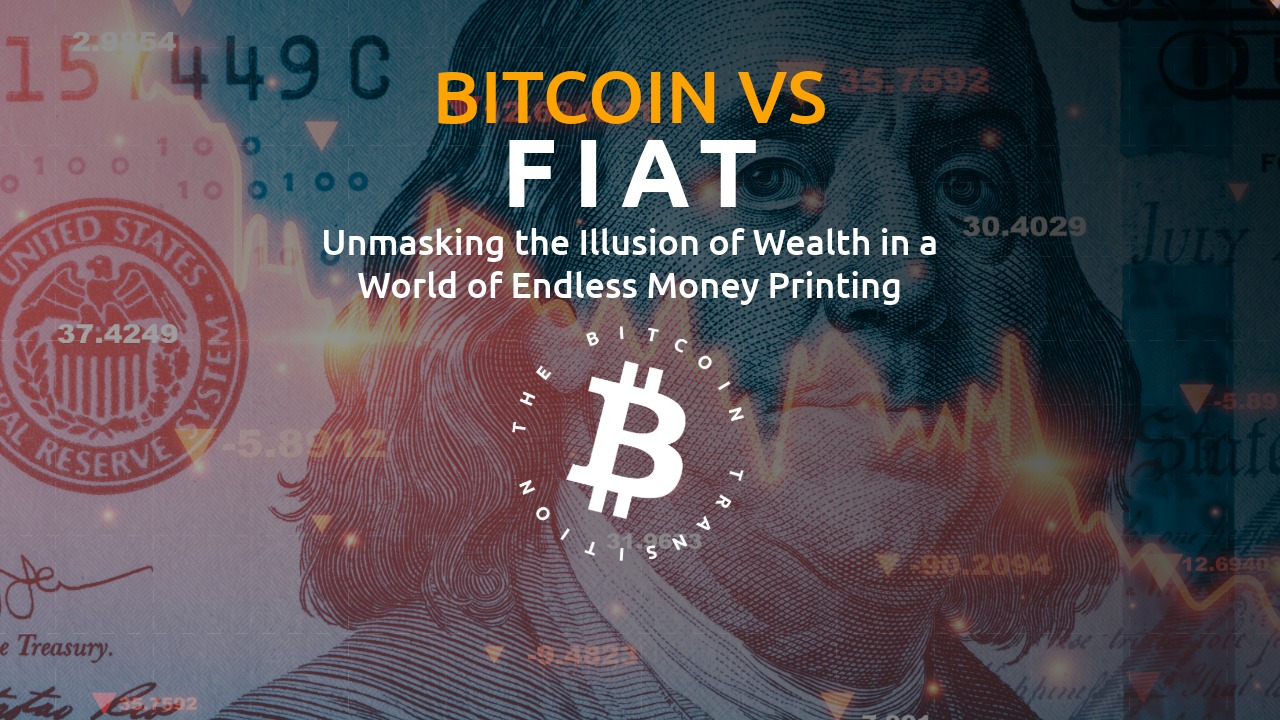How Fiat Currency Erodes Real Wages
How Fiat Destroyed Real Wages — A Gold-Based Salary Comparison

How Fiat Currency Erodes Real Wages: A Gold-Based Analysis of UK and US Salaries
For most of modern history, gold served as the bedrock of sound money — a universal measure of value that preserved purchasing power across generations. But with the 20th century came a global shift: governments abandoned the gold standard in favour of fiat currencies they could inflate at will. While this move gave policymakers more flexibility, it quietly devalued wages and savings over time.
To understand just how much purchasing power has been lost, we can turn to a neutral benchmark: gold. By comparing historical salaries in gold terms against what those same quantities of gold are worth today, we can see the true cost of fiat currency inflation.
And the results are sobering.
Key Findings
- The UK has lost 32.52% of its wage purchasing power in gold terms since 1931.
- The US has lost 93.89% since 1971.
- Despite the UK’s longer exposure to fiat currency, the US experienced a far greater collapse in real wages — likely due to its post-1971 monetary expansion and the dollar’s global reserve status.
The UK: From Sound Money to Silent Theft (1931–2025)
In 1931, the UK officially abandoned the gold standard. At that time:
- Average annual salary: £104
- Gold price: £4.94 per ounce
- Gold-equivalent salary: ~21 ounces
Fast forward to 2025:
- Gold price: £2,399 per ounce
- Value of 21 oz today: 21 × £2,399 = £50,379
- Average UK salary (2025): £34,000
- Gold purchased today: £34,000 / £2,399 ≈ 14.17 oz
Decline in gold-earning power:
(14.17 / 21) × 100 = 67.48%
32.52% loss in real wage value since 1931
This means the average UK worker today earns one-third less real value (measured in gold) than they did nearly a century ago.
The US: From Bretton Woods to Bretton Broke (1971–2025)
The US remained on a partial gold standard until 1971, when Nixon “temporarily” suspended dollar convertibility into gold — a move that permanently severed the tie between money and metal.
In 1971:
- Average annual salary: $10,622
- Gold price: $35 per ounce
- Gold-equivalent salary: 10,622 / 35 ≈ 303.5 ounces
In 2025:
- Gold price: $3,286 per ounce
- Value of 303.5 oz today: 303.5 × $3,286 = $997,281
- Average US salary (2025): $61,000
- Gold purchased today: $61,000 / $3,286 ≈ 18.56 oz
Decline in gold-earning power:
(18.56 / 303.5) × 100 = 6.11%
93.89% loss in real wage value since 1971
This is a staggering collapse. Despite nominal wages increasing six-fold, the actual value of those wages — in hard money terms — has evaporated.
What This Really Means
While the UK has had fiat currency since 1931 and the US only fully adopted it in 1971, the US has seen a far more aggressive devaluation in real wages. Why?
Because the US dollar became the global reserve currency after World War II. When the gold link was severed, it enabled the largest monetary expansion in human history — a tidal wave of fiat creation that flooded global markets and inflated asset prices, leaving wages behind.
Despite longer fiat exposure, UK wages fared better.
Why? Possibly because:
- The UK faced tighter fiscal constraints for longer periods.
- The US had more power to export inflation via its reserve currency status.
- Global dollar demand allowed the US to run larger deficits with fewer immediate consequences — until now.
The Fiat Illusion: Higher Numbers, Lower Value
Many people feel wealthier today because salaries are numerically higher than they were in past decades. But this is a trick of the unit. If you measure your income in fiat — a currency that continually loses value — you’ll always be chasing a moving target.
Measured in real terms, most people are poorer today than they were in prior generations.
- A UK worker in 1931 earned 21 ounces of gold.
- Today, that same worker earns 14.17 oz — a third less value.
- A US worker in 1971 earned 303.5 ounces.
- Today? Just 18.56 oz — a 94% collapse.
How to Protect Yourself
In an inflationary system, you must opt out of holding value in fiat if you want to preserve purchasing power.
Strategies for Wealth Preservation:
- Hold Hard Money Assets
- Gold: The historical benchmark for wealth preservation.
- Bitcoin: A digitally scarce, fixed-supply alternative with increasing adoption.
- Real estate: Tangible and typically appreciates over time.
- Invest in Productive Assets
- Businesses
- Equities in resilient sectors
- Infrastructure and energy-related assets
- Minimise Fiat Holdings
- Keep fiat only for short-term liquidity.
- Convert excess savings into assets that maintain or grow in value.
- Educate Yourself
- Understand the nature of money.
- Study the history of inflation, central banking, and monetary resets.
- Know why Bitcoin is emerging as a digital successor to gold.
Final Thoughts: Gold Exposes the Truth
When you measure wages in gold, the illusion of fiat wealth evaporates. What remains is a stark truth:
Central banks have inflated away your time, your energy, and your savings.
This is not just about numbers — it’s about justice. It’s about your ability to earn, save, and plan for the future without having your wealth eroded by decisions made behind closed doors.
If we want to fix inequality, restore prosperity, and give individuals control over their financial destiny, the solution lies in returning to sound money — whether that be physical gold, digital Bitcoin, or both.
We’re building a movement to help individuals and businesses opt out of the fiat system and thrive on a foundation of hard money.
Learn more at The Bitcoin Transition
Build Bitcoin-based income streams
Protect your wealth from silent theft
Help usher in the return of financial sovereignty


